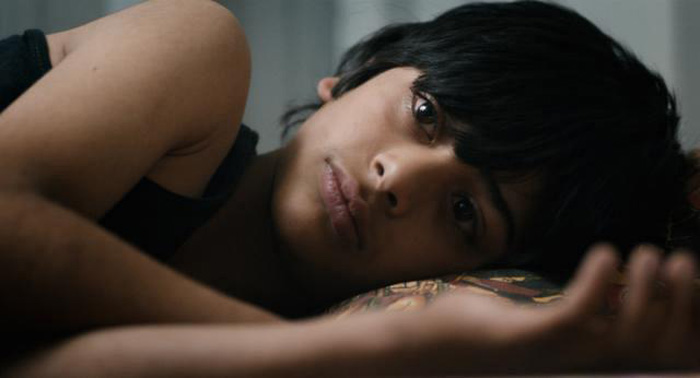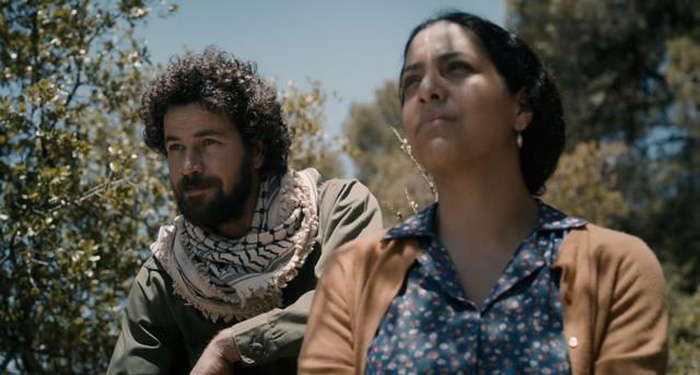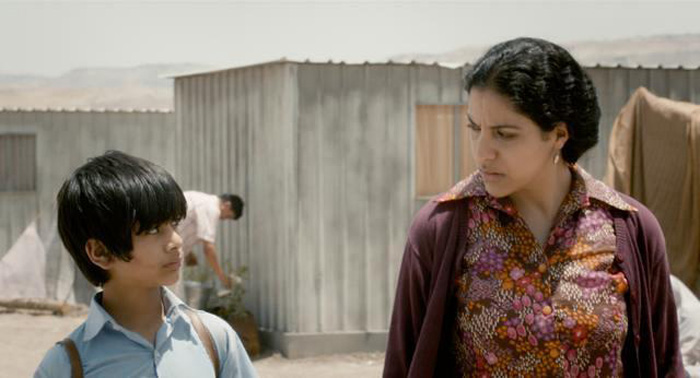Leave it to writer/director Annemarie Jacir to make an American more or less indoctrinated to side with the Israelis in the war for the Holy Land see her people’s freedom fighters (fadayee) in a sympathetic light. The first ever female Palestinian director—her debut feature Salt of This Sea was the region’s 2008 Oscar submission for Best Foreign Language Film—Jacir introduces us to the Harir Refugee Camp of 1967 Jordan through the eyes of an innocent. Young Tarek (Mahmoud Asfa) knows nothing about the fight raging or the deaths mounting, to him his displacement was a choice he’d like to overturn. Wanting to simply return home, find his father, and go on living with his own bathroom and kinder teacher, he will do whatever it takes to put his family back together.

لما شفتك [When I Saw You] isn’t solely about his journey home, however, as both his mother Ghaydaa (Ruba Blal) and the fadayee who take him under their wing play a large role in crafting an identity for the men and women striving to recover what they’ve lost. Tarek’s mother obviously feels the same as her son, but knows the camp is the safest place for now. Cramped in a makeshift home with soup kitchen type meals, a sense of community has remained despite being so far removed from the villages they once called their own. Weddings are performed, trucks come regularly with more transplants possibly containing another family member escaped from the battlegrounds, and hope itself is kept alive as the guerilla soldiers like Layth (Saleh Bakri) come to recruit new, willing fighters.
Looking to “follow the sun’s shadow” and return to Palestine, Tarek packs a bag and leaves on his pilgrimage. Illiterate yet smart as a whip when it comes to numbers, it’s his teacher refusing him entry to class that proves the camp possesses nothing for him. Hearing of the fadayee and seeing boys he knows leave for a chance to return as rebels, Tarek acknowledges the opportunity to reach his ultimate destination. Unaware of the danger, however, his being discovered by Layth is a true godsend. Integrating into the military world becomes an easy transition as the soldiers treat him as an equal. The ranking officer Abu Akram (Ali Elayan) utilizes the boy’s math skills to combat the rampant shirking of disciplinary exercises and the others teach him cards and the guitar while making him feel welcome where the refugees could not.

We as an audience see the fadayee as a group not out for blood or revenge—although a couple hotheaded novices give in to those desires—but instead a contingent looking to reclaim what they believe is theirs. This war was a rebellion way before it spiraled out of control with suicide bombers and terrorist activities. There is an admirable comradery at play that goes beyond following orders. Akram is an intellectual spouting philosophical quotes; Layth a leader refusing to let emotion cloud judgment when it comes to declaring a soldier ready for combat; and each fresh-faced youth sees Tarek as why they volunteered. More than selfish reasons, they joined so future generations could grow up in peace and on land they can call their own. Ghaydaa’s question, “How did we lose everything?” may never be answered, but they won’t sit back to let it happen.
Less about the war, though, When I Saw You deals with the ability to survive. Jacir is obviously juxtaposing the conservative safety of a camp with the mysteries of the unknown inherent to guerilla warfare by flipping the danger levels to make surrender just as volatile or more. When Ghaydaa runs after her son and ends up settling down in the makeshift basecamp with him, she too has her eyes opened to the surprising level of compassion at the rebellion’s back. Finally Tarek has been included, accepted into a community willing to look past his shortcomings and see the bright young man before them. Both Layth and Akram unwittingly become father figures in the absent of his own as the boy for the first time since leaving his home is alive with excitement and purpose.

Asfa is a treat to watch with a stubborn flair for the dramatic. He holds his own against the more seasoned cast, keeping them on their toes and adding a wonderful sense of comedy to break the tension of their dire situation. He is the foil of both Bakri and Blal, each lost in the severity of what has happened to their homeland and in desperate need of giving in to the innocence and joy Tarek can bring. Coming from different ideologies, they slowly thaw to discover they aren’t so different after all. He wants to do what he can to reclaim his birthright while she has resigned herself to believe that chapter of her life has closed. It’s only through Tarek’s purely emotional desire devoid of man-made constraints such as politics or religion that they find common ground to understand what must be done.
Through brief sparks of levity and immense strength of familial community, Jacir humanizes a people many have been taught to despise as villains. She gives Palestinians a voice in their quest—whether right or wrong—to return to the lives they once led. With a couple of gorgeous campfire songs and more even subtler details, she exposes her audience to a culture not alike our own by stripping away the present, warped message of destruction that’s replaced it in the world’s consciousness. Tarek like all children of war never wanted the fight; it was brought to him when the only world he ever knew was irrevocably shattered. His hasty, misguided quest for normalcy reminds his brethren why they fight while showing us outsiders how powerful the human spirit is and always will be despite circumstances trying their hardest to prevent it.
When I Saw You is playing the Toronto International Film Festival Sept. 9th, 11th & 15th.


